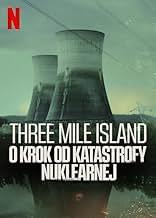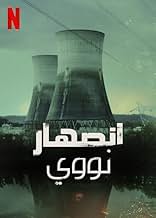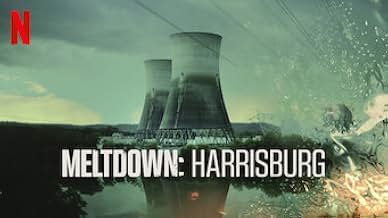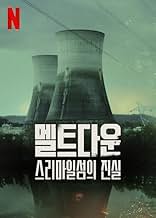अंदरूनी सूत्रों ने पेंसिल्वेनिया में थ्री माइल आइलैंड परमाणु ऊर्जा संयंत्र में दुर्घटना की घटनाओं, विवादों और लंबे समय तक चलने वाले प्रभावों का वर्णन किया.अंदरूनी सूत्रों ने पेंसिल्वेनिया में थ्री माइल आइलैंड परमाणु ऊर्जा संयंत्र में दुर्घटना की घटनाओं, विवादों और लंबे समय तक चलने वाले प्रभावों का वर्णन किया.अंदरूनी सूत्रों ने पेंसिल्वेनिया में थ्री माइल आइलैंड परमाणु ऊर्जा संयंत्र में दुर्घटना की घटनाओं, विवादों और लंबे समय तक चलने वाले प्रभावों का वर्णन किया.
- पुरस्कार
- 5 कुल नामांकन
एपिसोड ब्राउज़ करें
फ़ीचर्ड समीक्षाएं
I'm sure they were all virologists this morning and climate scientists in the afternoon.
I was eight years old when TMI happened. We lived in Mechanicsburg, PA, 18 miles away - - can remember getting picked up from school out of the blue by my parents and riding to my aunt and uncle's in Allentown. Part of the documentary is about that unknown and just how worrisome it was for those who lived in South Central PA.
For those who say there weren't any "experts" heard from in the documentary, I'm not sure what they were watching. It's pot calling kettle black for everyone who is claiming bias with the film - - multiple experts are interviewed, but obviously not ones such reviewers want to hear from. It does spend most of the time in the later episodes with the whistleblower. It has a point of view. Other than that, the complaints are what is overblown, not the story of TMI as rendered here.
I was eight years old when TMI happened. We lived in Mechanicsburg, PA, 18 miles away - - can remember getting picked up from school out of the blue by my parents and riding to my aunt and uncle's in Allentown. Part of the documentary is about that unknown and just how worrisome it was for those who lived in South Central PA.
For those who say there weren't any "experts" heard from in the documentary, I'm not sure what they were watching. It's pot calling kettle black for everyone who is claiming bias with the film - - multiple experts are interviewed, but obviously not ones such reviewers want to hear from. It does spend most of the time in the later episodes with the whistleblower. It has a point of view. Other than that, the complaints are what is overblown, not the story of TMI as rendered here.
The story of corruption and mismanagement is not that surprising. Still kinda interesting. But in typical Netflix fashion, long winded and repetitive.
But the real lesson of this documentary is how far we've come in nuclear tech.
We see the complete lack of computer technology in the 1970's. This makes it clear that the US should continue leading the way and sell Gen IV tech to the rest of the world -where the other 95% of humans live, and where carbon emissions are growing at an extraordinary rate. My beloved France and Germany are already returning to nuclear. But the rest of the world is polluting like crazy. Enough is enough.
But the real lesson of this documentary is how far we've come in nuclear tech.
We see the complete lack of computer technology in the 1970's. This makes it clear that the US should continue leading the way and sell Gen IV tech to the rest of the world -where the other 95% of humans live, and where carbon emissions are growing at an extraordinary rate. My beloved France and Germany are already returning to nuclear. But the rest of the world is polluting like crazy. Enough is enough.
I'm not sure why so many nuclear power fans are upset by this docuseries. It does lean on the dramatic, but the message of pro-nuclear power is repeated over and over by one of the main interviewees. The concern is not the technology, but the rich men we entrust to run nuclear plants safely. All this docuseries want is responsibility in the operation of public utilities, and I can't see why anyone would find that bad. It's a compelling view into the, pardon the pun, fallout of the accident, and worth the time for people interested.
{NOTE: the 1-star review "Do not watch for accurate facts" is relevant (but also incomplete) IMHO}
This documentary is excellent ... by Netflix standards. An example of a terrible documentary is the one they did on MH370, which was overly-long and spent copious time on inane conspiracy theories.
Meltdown: TMI goes a great job showing the cover-up attempts and related corruption, as well as the toll on the residents. It does NOT do a good job explaining the details of the initial accident and the misguided response. You have to have a VERY good reason to turn off cooling pumps and/or High-Pressure Injectors (HPI) when a reactor's temperature is getting out of control, and this was poorly explained. To be fair, some details of this accident were NEVER properly explained (see Wikipedia), but still -- Netflix could have done a better job, instead of showing the same distraught locals over and over and over again.
There are some unanswered questions. The NRC still claims very little radiation was released, despite the dead fish observed and a least one person with radiation "burns" (lesions) over much of her body. What happened to this person? Why wasn't she Exhibit A in (eventually) refuting the platitudes the NRC and GPU (the plant owner) told the public?
This documentary had the potential for ten stars. However, given the flaws, I'm giving it eight (8) stars. Mind you, it's still gripping and effective; I'm still angry the next day. FYI, I'm an engineer and have some actual knowledge of the cooling systems and related thermodynamics. I even tested my knowledge on a NPP failure simulator.
This documentary is excellent ... by Netflix standards. An example of a terrible documentary is the one they did on MH370, which was overly-long and spent copious time on inane conspiracy theories.
Meltdown: TMI goes a great job showing the cover-up attempts and related corruption, as well as the toll on the residents. It does NOT do a good job explaining the details of the initial accident and the misguided response. You have to have a VERY good reason to turn off cooling pumps and/or High-Pressure Injectors (HPI) when a reactor's temperature is getting out of control, and this was poorly explained. To be fair, some details of this accident were NEVER properly explained (see Wikipedia), but still -- Netflix could have done a better job, instead of showing the same distraught locals over and over and over again.
There are some unanswered questions. The NRC still claims very little radiation was released, despite the dead fish observed and a least one person with radiation "burns" (lesions) over much of her body. What happened to this person? Why wasn't she Exhibit A in (eventually) refuting the platitudes the NRC and GPU (the plant owner) told the public?
This documentary had the potential for ten stars. However, given the flaws, I'm giving it eight (8) stars. Mind you, it's still gripping and effective; I'm still angry the next day. FYI, I'm an engineer and have some actual knowledge of the cooling systems and related thermodynamics. I even tested my knowledge on a NPP failure simulator.
I didn't feel like this was about fear in nuclear energy. This event set it back, but it's still viable and prevalent. This is about human error, regulation failure, and high level corporate and government corruption.
क्या आपको पता है
- कनेक्शनReferenced in Film Junk Podcast: Episode 846: Doctor Strange in the Multiverse of Madness (2022)
टॉप पसंद
रेटिंग देने के लिए साइन-इन करें और वैयक्तिकृत सुझावों के लिए वॉचलिस्ट करें
- How many seasons does Meltdown: Three Mile Island have?Alexa द्वारा संचालित
विवरण
- रिलीज़ की तारीख़
- कंट्री ऑफ़ ओरिजिन
- आधिकारिक साइट
- भाषा
- इस रूप में भी जाना जाता है
- أختان برباط الدمّ
- उत्पादन कंपनियां
- IMDbPro पर और कंपनी क्रेडिट देखें
इस पेज में योगदान दें
किसी बदलाव का सुझाव दें या अनुपलब्ध कॉन्टेंट जोड़ें







































